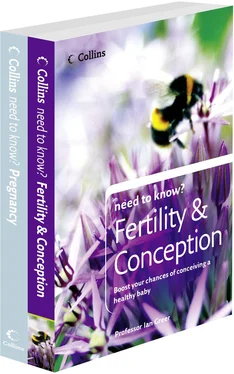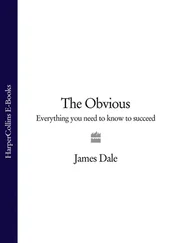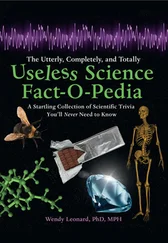need to know?
Fertility & Conception and Pregnancy
Harriet Sharkey and Prof. Ian Greer

Cover Page
Title Page need to know? Fertility & Conception and Pregnancy Harriet Sharkey and Prof. Ian Greer
Need to Know Fertility and Conception need to know? Fertility & Conception and Pregnancy Harriet Sharkey and Prof. Ian Greer
Need to Know Pregnancy need to know? Fertility & Conception and Pregnancy Harriet Sharkey and Prof. Ian Greer
Copyright
About the Publisher
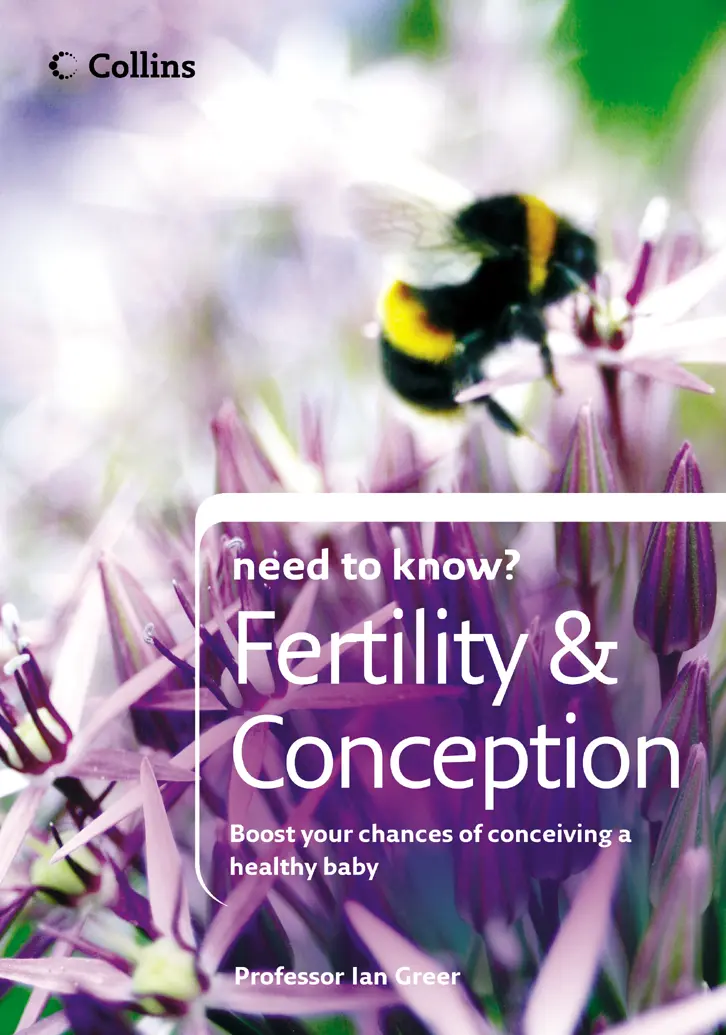
Cover Page
1. Conception 1. Conception It takes just one egg and one sperm to conceive, but getting them together is not always easy. Following sex, over 250 million sperm set off on a ‘race’ to find and fertilize the egg, but only one makes it all the way to the finish to enter the egg and trigger the whole process of making your baby. These are tough odds. But this is not the beginning, because producing the sperm and eggs is the culmination of complex processes in your and your partner’s bodies, processes that must be carefully regulated by reproductive hormones (chemical messengers). So when starting to think about pregnancy perhaps the most logical starting point is to understand how your own body’s reproductive system works.
2. A healthy pregnancy
3. Fertility problems and treatment
4. Assisted conception
5. You’re pregnant!
6. Facing problems
List of Search Terms
1. Conception 1. Conception 1. Conception It takes just one egg and one sperm to conceive, but getting them together is not always easy. Following sex, over 250 million sperm set off on a ‘race’ to find and fertilize the egg, but only one makes it all the way to the finish to enter the egg and trigger the whole process of making your baby. These are tough odds. But this is not the beginning, because producing the sperm and eggs is the culmination of complex processes in your and your partner’s bodies, processes that must be carefully regulated by reproductive hormones (chemical messengers). So when starting to think about pregnancy perhaps the most logical starting point is to understand how your own body’s reproductive system works. 2. A healthy pregnancy 3. Fertility problems and treatment 4. Assisted conception 5. You’re pregnant! 6. Facing problems List of Search Terms
It takes just one egg and one sperm to conceive, but getting them together is not always easy. Following sex, over 250 million sperm set off on a ‘race’ to find and fertilize the egg, but only one makes it all the way to the finish to enter the egg and trigger the whole process of making your baby. These are tough odds. But this is not the beginning, because producing the sperm and eggs is the culmination of complex processes in your and your partner’s bodies, processes that must be carefully regulated by reproductive hormones (chemical messengers). So when starting to think about pregnancy perhaps the most logical starting point is to understand how your own body’s reproductive system works.
Regular menstrual bleeding is controlled by a complex system. The brain controls the release of ‘signalling’ hormones called gonadotrophins from the pituitary gland at the base of the brain. There are two gonadotrophins: follicle-stimulating hormone (FSH) and luteinising hormone (LH).
Blood loss
Periods usually last for five to seven days. No matter whether periods are light or heavy, most of the blood is lost in the first three days. Average monthly blood loss is 30-40 ml (2-2¼ fl oz). Women with abnormally heavy periods lose over 80 ml (nearly 3 fl oz) of blood each time.
A woman is born with a lifetime’s supply of eggs. During each menstrual cycle, FSH stimulates immature eggs contained in the ovaries to develop within small fluid-filled sacs known as follicles. Initially, several eggs begin to mature but generally only one continues to develop to full maturity. This is known as the ‘dominant follicle’. Other eggs stop developing and disintegrate. When the egg is mature, the follicle it is contained within is about 2 cm (¾in) in diameter. As well as nurturing a developing egg, follicles also produce the female hormone oestrogen. When oestrogen levels are optimal and the egg is fully developed, the release of luteinising hormone (LH) occurs. This surge in the LH level triggers the release of the egg. This process is called ovulation.
Ovulation deals with egg production. However, if this egg is fertilized, it needs to implant in the womb. So it is important for the womb to be prepared for a fertilized egg, and oestrogen has a role here too. Oestrogen stimulates the lining of the womb (the endometrium) to grow and thicken. After the egg is released from the ovary, the remains of the follicle that released the egg produces a
Your cycle length
• This whole process takes around a month, and so the interval between menstrual periods is most commonly about 28 days.
• In some women, the cycle can occur every 21 days while in others it may take up to 35 days. So the normal range for the menstrual cycle is between 21 and 35 days.
• Day 1 of a cycle is the first day on which menstrual bleeding will occur.
hormone called progesterone. (Progesterone is only made after an egg is released.) It acts on the lining of the womb by stopping its thickening at the right stage. It also improves the endometrium’s blood supply and makes it a suitable and ‘comfortable’ environment for the fertilized egg to implant.
If a fertilized egg does not implant, the production of progesterone from the ovary falls sharply. As these hormone levels fall, the blood supply to the lining of the womb is reduced and the endometrium is shed. This results in the bleeding that we know as a period. The cycle then starts over again.
As ovulation (production of a mature egg) is essential for a regular menstrual cycle, women who have a regular cycle in the normal range are usually ovulating regularly. Conversely, women who do not ovulate regularly have irregular and usually infrequent periods.
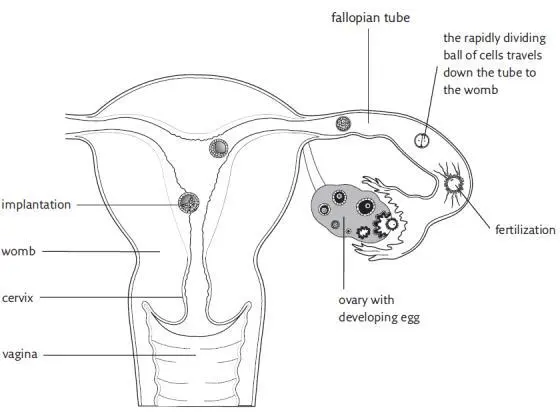
The time of ovulation depends on the length of the menstrual cycle. If a woman has a 28-day cycle, ovulation occurs at around day 14, and if she has a 21-day cycle, ovulation occurs at around day 7. The time taken to mature an egg and ovulate can vary from woman to woman. The part of the cycle during which the egg develops is called the follicular phase, as the egg develops in a small ‘follicle’ or cyst in the ovary. However, the time from ovulation to a period (if fertilization does not occur) is fixed at around 14 days. This is called the secretary phase of the cycle as the ovary makes and ‘secretes’ progesterone. Provided your cycle is regular, you will be able to estimate when you will be ovulating.
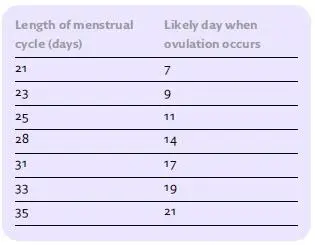
The optimum time of fertility
Читать дальше
